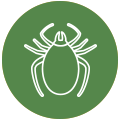What is tick-borne encephalitis (TBE)?
Tick-borne encephalitis, also known as TBE, is a rare infection of the central nervous system that affects the brain, spinal cord and membranes around them.1 Encephalitis means inflammation of the brain and can be caused by a number of different infections.2,3People develop TBE if they have been bitten by a tick that is infected with the TBE virus.4
This page will help support you to identify signs and symptoms of TBE. To check whether you are at risk of TBE infection, we recommend that you explore the TBE risk map, risk factors page and consider what precautions you can take before you travel.

How is TBE different from Lyme disease?
Transmission- not all tick bites are the same
Both TBE and Lyme disease are transmitted to people by an infected tick*.2,5 TBE can be transmitted immediately with one bite whereas Lyme disease requires an infected tick to be attached for more than 24 hours.6 The bites are usually painless but the reaction to the infected bite is different for each disease.2,5
Symptoms
With TBE, the majority of people infected have no early symptoms,2 or in some cases, may confuse symptoms of headache or muscle pain with that of mild flu.4 With Lyme disease, an early circular red skin rash with a target-like appearance around the tick bite forms.7 Both diseases can show symptoms up to 28-30 days after being bitten.5
Find out more about the symptoms of TBE
Type of infection
TBE is a viral infection, transmitted by a tick infected with a virus belonging to a group of viruses known as flaviviruses.4 Lyme disease is a bacterial infection, transmitted by a tick infected with a bacterium called Borrelia burgdorferi.8
TBE is a virus and so it can't be treated with antibiotics. There is no specific treatment for TBE.4
On the other hand, Lyme disease is a bacterial infection and can be treated with antibiotics.8
Geographical location
Although both TBE and Lyme disease are transmitted by infected ticks, they have different geographical spreads.1,9
To check whether you are at risk of TBE infection based on the country you are in or visiting, we recommend that you explore the TBE risk map.
* It is also possible, but uncommon, to contract TBE by consuming unpasteurised infected milk or milk products.1
Diagnosis
If TBE is suspected, based on signs, symptoms and travel history, a blood or spinal fluid sample would be taken by a healthcare professional and sent for laboratory testing to detect TBE virus or another infection causing similar symptoms.10If TBE is detected, it will be reported to Public Health England.11
If you have been bitten by a tick or visited a TBE risk area in the past month and experience symptoms of TBE, feel unwell or the bite area does not start to heal after a couple days, contact your GP or call NHS 111. If you experience more severe symptoms, such as loss of movement in part of your body, call 999 or go to A&E.11
Treatment
There is no specific treatment for TBE, only supportive measures to treat the symptoms while your immune system fights off the virus and to help prevent complications.4
While most people will recover fully, TBE can impact physical fitness and the ability to work, as well as problems with memory, concentration, or irritability.12
For those who get infected with TBE, 1 in 3 people can have long-term brain problems that last months or years.1
TBE has no cure but has the potential to cause serious and complicated consequences.12 Therefore it is important to know about the precautions you can take to help to protect you and your loved ones against TBE while in areas where infected ticks have been found. You can find out more about what you can do here.
Explore

About ticks
Find out more about ticks, the diseases they can transmit and how they do so.
How to remove a tick
Find out more about how to safely and effectively remove a tick should you find one on your body.

Find out more about the TBE risk factors
Find out your risk of TBE exposure based on where you live, where you are visiting, the time of year and the activity type.